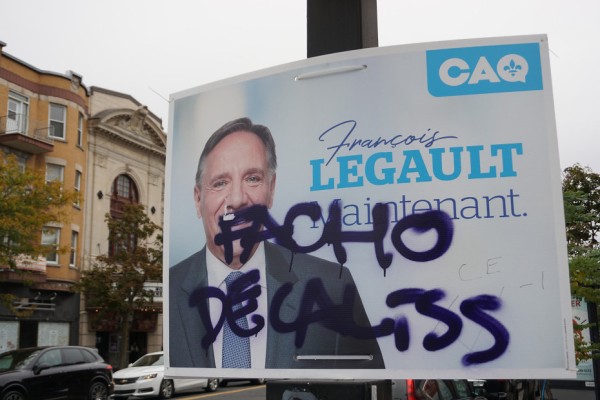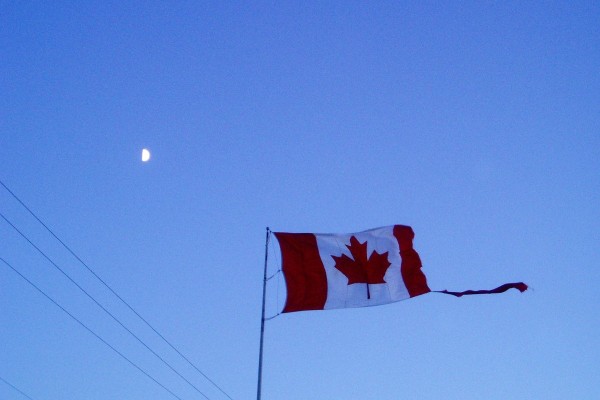-

 Le nationalisme québécois ou le fascisme patient
Le nationalisme québécois ou le fascisme patientAlors que l’élite politique québécoise mène une guerre silencieuse contre la société civile, le nationalisme s’est transformé en un autoritarisme patient et calculé. Derrière les discours sur la « laïcité » et la « cohésion », la CAQ et le PQ poursuivent un programme commun qui concentre le pouvoir, érode les libertés et conduit le Québec vers un totalitarisme raisonnable.
-
_600_400_90_s_c1.jpg)
The left should defend democracy, not Ottawa’s bid to curb the notwithstanding clause
Ottawa wants the Supreme Court to curb provincial use of the notwithstanding clause, but progressives shouldn’t cheer. Limiting Section 33 risks eroding democratic accountability and inflaming national unity tensions. Dónal Gill argues the left must reclaim defence of parliamentary sovereignty, even when its uses are politically uncomfortable.
-

Responding to Donald Trump with a popular democratic project for Canada
The unfolding climate catastrophe, growing inequality, the disintegration of the country’s social safety net, and the rise of profoundly reactionary yet increasingly viable political forces at home and abroad make it imperative for Canadian socialists to develop strategies to begin to substantively challenge Canadian elites at the national scale.
-
_800_600_90_600_400_90_s_c1.jpg)
Amazon closures an act of economic terrorism
Terrorism is defined as an act of violence, usually harming innocents, that is motivated by a political or ideological goal. By that standard, write economist Jim Stanford, Amazon’s decision to shut all seven of its warehouses (euphemistically called ‘fulfilment centres’) in Québec, to avoid unionization at one of those warehouses, is an act of economic terrorism.
-

A single image’s many stories
Time and again, the McGill University administration, along with provincial government officials, has refused dialogue with student protesters, preferring to make a violent show of power over activists who remain steadfast in their aim: to make this summer a freedom summer aimed at contributing to ending genocide, occupation and colonialism.
-

A common language: Critical metals and Québec’s clientelist relationship with France
Québec’s ambitious strategy for regional development across the entire lifespan of rechargeable batteries proposes real benefits in a challenging transition away from fossil fuels and dependence on conflict resources, but at what cost? As the meeting between Attal and Legault shows, Québec’s future is being shaped to cater to big capital.
-

McGill admin: Listen to the cops and talk to students
Instead of negotiating with pro-Palestinian protesters whose demands have broad support among the university community, the administration wants to force the police to intervene. As Yves Engler writes, perhaps the McGill administration should listen to the cops: talk to the students. Negotiate. Compromise. Settle peacefully.
-

Wholesale privatization, false solutions
Critics agree that the CAQ’s reforms have politicized health care, treating it more and more as just another market sector rather than a social good. As Lital Khaikin outlines, ‘entrepreneurial solutionism’ is transforming health care in Québec into a commodity to be exploited by venture capitalists and made available differentially to those who can afford it.
-
The student Intifada rises at Montréal universities
Students from all four Montréal universities came together over the last week to express their solidarity with the Palestinian people and pressure their institutions to cut ties with Israel. Following the lead of the camps protests in the United States, they set up an encampment on the grounds of McGill University on April 27.
-

Green Québec: a whiter shade of pale
While not a market-worshipper of Danielle Smith’s ilk, Québec Premier François Legault has a vision of the province that still revolves around a profit-driven market economy with growth-oriented goals. For an increasingly large body of environmental opinion, however, the very nature of such an economy undermines efforts to ‘save the planet.’




